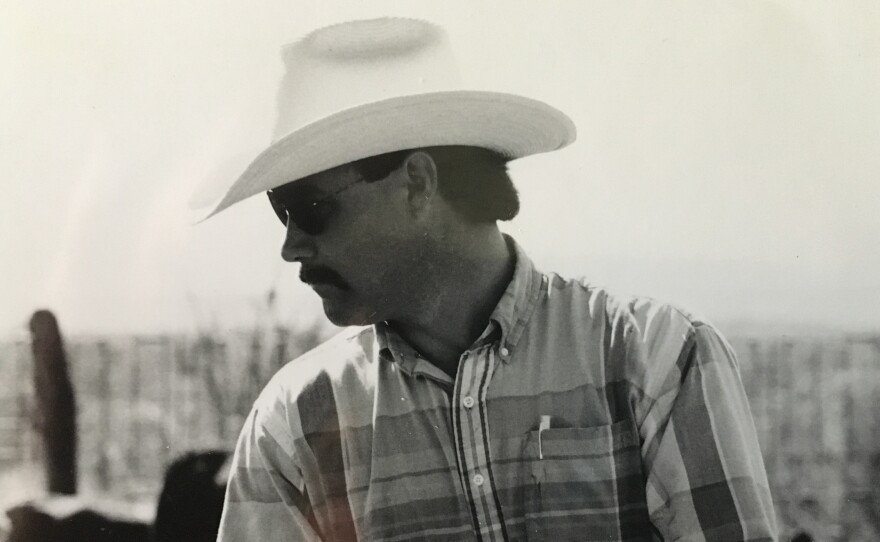Growing up on the plains of West Texas, Lanny Copeland says there weren't too many options for a young man looking to make a living.
"If you weren't a farmer," Copeland says, "chances were pretty good you were in the oil field."
But from early on, he knew what he wanted to be when he grew up — to follow in his father's footsteps as a cowboy and ranch manager.
"You felt like you were a part of history," Copeland says, "taking part in the great Texas cattle industry."
After studying range land management and animal husbandry at Texas A&M;, Copeland spent years wrangling cattle for other owners, until one day in the mid-1990s he and his father were offered the opportunity to buy out part of their boss' herd, to begin a business of their very own.
"To have something of our own was the greatest feeling in the world to me," says Copeland. "And I think to Daddy as well, cause he had developed this herd of cattle, and he had managed this land for so long."
For 10 years, things went well for the Copelands. Despite intermittent seasons of low rainfall, they managed to keep their herd healthy, and their operation afloat. But in the mid-2000s, a prolonged drought finally proved too much.
"Even with the best herd you can put together," Copeland says, "if the weather doesn't cooperate and the drought doesn't break, at some point, it doesn't matter."
Copeland and his father were forced to cut their losses and sell off their remaining cattle and equipment.
"I found myself at 44 years old, really wondering what in the world am I going to do now," he says, "because this is pretty much all I've ever done."
For months, Copeland struggled to find a new line of work, hoping to secure a new means of supporting a daughter in college and a son in junior high. Until one day, in the late winter of 2008, Copeland came across a notice for a wind energy job fair, hosted by a power company called Invenergy, at a Lubbock, Texas, hotel. Copeland thought he might be one of five or six attendees, and decided to give it a shot.
Instead, Copeland says he found a room packed with over a hundred prospective applicants, many of them decades younger than him.
"I felt pretty old in that room because there were a lot of 25-year-old guys with applications in their hands," Copeland says.
Nevertheless, he submitted his application and hoped for the best. Not too long afterwards, he received a call from a hiring manager, inviting him to visit one of the company's facilities for an aptitude test and to take a mandatory climb test. When the manager asked about whether he would be able to climb one of the towering turbines, he says he was honest about his misgivings.
"I remember telling him, 'I have no idea if I can do it,' " says Copeland, "didn't like heights much anyway and said, 'yeah, we'll see.' "
Sure enough, when he arrived, the task seemed daunting. "That was the longest ladder I'd ever seen in my life," he says.
In the end, Copeland made it easily to the top of his first wind turbine, and when he did, he says he found a beautiful landscape waiting below. Looking out over an expanse of rolling ranch lands, sprinkled with wind turbines, Copeland says he knew that he had found something worth pursuing.
"I remember thinking — 'not many people have ever done this,' " says Copeland.
Copeland passed that turbine climbing test, and now, nine years later, he works as an Operations and Maintenance Manager for Invenergy, overseeing two wind farms and 27 wind turbine technicians in Texas.
Copeland says he was lucky to find his way into the Texas wind industry when he did. Texas currently produces the most wind energy of any state in the country, and earlier this year "wind turbine technician" was named the fastest growing job in the U.S. economy by the Bureau of Labor Statistics.
As for Lanny Copeland, he says he's striking a balance between his old professional identity and his new one.
"Do I still see myself as a cowboy?" Copeland asks. "Yeah, I do. And I hope I always do." Still, Copeland says, he's thrilled to have found a new life for himself in the booming Texas wind industry.
"It's the future," he says. "Wind energy is the future."
Copyright 2017 NPR. To see more, visit http://www.npr.org/.






